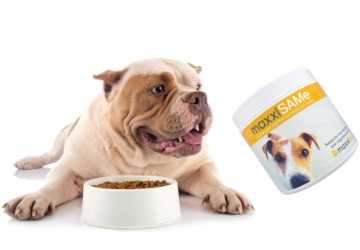Our beautiful dogs are seniors with different health issues that must be addressed. As much as humans require supplements for their health, dogs, especially seniors, can benefit significantly from them.
When you include selected supplements into the elderly dog's diet, you can easily cope with numerous problems characteristic of senior pets. The right supplements can support the joint, brain, and immune health.
In this blog post, we will cover six supplements that can help your senior dog so much. Read on to learn how these supplements can support your best buddy in their later years.
The Importance of Supplements for Senior Dogs
Like any other animal, dogs are not immune to diseases, and as they grow older, they develop many health complications. Supplements solve these issues and are essential to the well-being of a senior dog.
Specific vitamins and minerals, such as glucosamine, chondroitin, and MSM, can be taken as supplements to aid joint health and reduce discomfort.
Digestive problems may also be observed in dogs in old age. Probiotics and digestive enzymes can help maintain a healthy gut and enhance the ability to digest food.
This means that by feeding your senior dog the right supplements, you will be able to treat common illnesses and ensure that your dog gets a healthy extra boost to help senior dogs live their best lives.
6 Key Supplements to Support Your Senior Dog's Health
Now that you have understood why supplementation for senior dogs is crucial. Let's review the six beneficial supplements for your pet's health.
1. Glucosamine and Chondroitin
Glucosamine and chondroitin are two vital compounds for joint health. These supplements assist in maintaining the cartilage and joints and, in the process, minimize inflammation and pain related to arthritis.
Once included in their diet, glucosamine and chondroitin improve your senior dog's mobility and ease.
These supplements are usually administered daily and come in different forms, including chewable tablets, powders, and liquids; consult your veterinarian for the right dosage.

2. Omega-3 Fatty Acids
Omega-3 fatty acids are beneficial in so many ways for senior dogs. They contribute to the skin and coat health, decrease inflammation, and improve joint health.
Furthermore, omega-3s are essential for the brain and the heart's health.
Consult with your veterinarian to determine the proper dosage for your pet, and consider fish oil supplements or omega-3-enriched dog foods.
Ensure the supplement is safe from impurities to provide maximum efficiency and safety.
3. Probiotics
Probiotics contain living beneficial bacteria that are good for the gut's health. So, adding probiotics to your senior dog's diet will enhance digestion and nutrient assimilation and decrease the signs of IBD.
It is advisable to consult your veterinarian on how much probiotics your dog should be given.
These supplements are available as powders, capsules, or special dog foods that have been processed to contain one or more of them. For the best results, make sure the product has active cultures.
4. Antioxidants
Antioxidants help prevent the damaging of the senior dog's cells through oxidation, strengthen the immune system, and decrease inflammation.
Incorporating antioxidants into the dog's diet will help it stay healthy. Some widely known antioxidants are vitamin C, E, and coenzyme Q10.
Always ask your vet for the correct dosage. Supplements are available as chewable tablets, powders, and antioxidant-rich dog foods.
5. Fiber Supplements
Fiber supplements are essential for your senior dog's digestion. They help support regular bowel movements, minimizing constipation and diarrhea while contributing to the ideal body weight.
Ask your vet for the recommended kind and amount of fiber supplement your dog should receive.
These supplements are available as powders, tablets, or as part of special dog food that has been processed to contain them. Make sure that the supplement you will use is suitable for your dog's condition.
6. SAMe (S-Adenosylmethionine)
SAMe is an amino acid formed naturally that is beneficial for the liver and brain in senior dogs.
It aids the liver as a detoxifying agent, supports brain function, and may help ease signs of arthritis, leading to better joint functioning. Ask your vet how much SAMe you should give your senior dog.
This supplement is commonly taken once a day and is offered in chewable tablet or capsule form. Daily use of SAMe can benefit your dog's liver and brain health as it ages.

Give Your Senior Dog the Gift of Vibrant Health
By incorporating these six essential supplements into your senior dog's diet, you can proactively support its health and help it enjoy its golden years.
Take action before your dog is suffering from age-related issues. Consult with your veterinarian today about adding these supplements to your senior dog's routine.
By taking a proactive approach, you can give your loyal companion the gift of vibrant health and a better quality of life.
Your senior dog deserves the best; you can help it thrive with the right supplements. Start today and see the difference for yourself.
Frequently Asked Questions
Q. How do I know if my senior dog needs supplements?
Ans. If your senior dog has symptoms such as joint pain, stiffness, decreased activity, diarrhea, or loss of housetraining, it may be time for supplements. Always seek advice from your vet regarding your dog to get the most appropriate advice for your pet.
Q. Can I give my dog human supplements?
Ans. Human supplements should not be given to dogs because they may contain certain substances or in specific concentrations that are toxic to the dog. Supplements should also be sourced for dogs and only started under the recommendation of a veterinarian.
Q. How long does it take to see the benefits of supplements in my dog?
Ans. The periods it takes to experience the effects of supplements depend on the type of supplement in question and the dog's reactions. Some supplements will give you results within a few weeks, while others will take several months. There is no better strategy than consistency if the best results are desired.
Q. Are there any risks associated with giving my dog supplements?
Ans. Supplements are safe for dogs when administered as recommended by the veterinarian. However, constantly monitor your dog to see if it is having any adverse effects and cease use if it is. If you have any concerns, consult with your vet right away.
